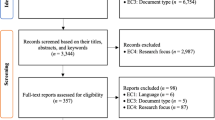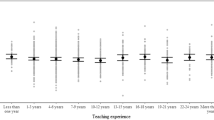Abstract
From previous and current efforts at science education reform, the author teases out a certain “culture of reform,” a set of assumptions about educational change that are no longer (if they ever were) appropriate to another task, namely managing change. With reference to a group of programs in undergraduate science instruction that work, she finds the research model, the preference for innovation, the dependence on short-term outside funding, and above all, the seeking after some universal curriculum or set of pedagogies that will solve the problem for all time, to be naive in terms of the reality and the politics of change. She would substitute what Gerald Holton in “A Nation at Risk, Revisited” calls “cumulative improvement,” and ends with some suggestions as to how such a model could be applied to the organization of college-level instruction in science.
Similar content being viewed by others
References
Anonymous (1991). U.S. budget: NSF wins, space science loses.Nature 353: 372.
Arons, A. (1992). Uses of the past: Physics curricular reform 1955–1985,Journal of Educational Thought.
Boyer, E. L. (1989).The Condition of the Professoriate: Attitudes and Trends Princeton University Press, Lawrenceville, New Jersey.
Duderstadt, J. (1991). Keynote address. InThe Freshman Year in Science and Engineering. The Alliance for Undergraduate Education, p. 6.
Holton, G. (1986). A nation at risk, revisited. InThe Advancement of Science and its Burdens The Press Syndicate of the University of Cambridge, Cambridge, England.
Jackson, P. W. (1983). The reform of science education: A cautionary tale.Daedelus 112(2): 143–166.
Kanter, R. M. (1983).The Change Masters Simon and Schuster, New York.
Kline, M. (1977).Why the Professor Can't Teach: Mathematics and the Dilemma of University Education St. Martin's Press, New York. p. 190.
Lederman, L. (1990). Teaching teachers: A Nobel laureate's plan for improving science education.Scientific American 263: 34.
Matyas, M. L., and Malcom, S. M. (Eds.) (1991).Investing in Human Potential: Science and Engineering at the Crossroads American Association for the Advancement of Science, Washington, D.C.
National Commission on Excellence in Education U.S. Department of Education (1983).A Nation at Risk: The Imperative for Educational Reform. Washington, D.C.
National Research Council (1989).Everybody Counts: A Report to the Nation on the Future of Mathematics Education — Summary National Academy Press, Washington, D.C.
Pister, K. S. (1991).Report to the University-wide Task Force on Faculty Rewards Office of the President, University of California, Oakland, California.
Richardson, V. (1990). Significant and worthwhile change in teaching practice.Educational Researcher 19: 10–17.
Saltman, P. (1991). Scientists educate the science educators.Science 252: 1061.
Tobias, S. (1990).They're not Dumb They're Different: Stalking the Second Tier Research Corporation, Tucson, Arizona.
Tobias, S. (1992).Revitalizing Undergraduate Science: Why Some Things Work and Most Don't Research Corporation, Tucson, Arizona.
Traweek, S. (1989).Beamtimes and Lifetimes Harvard University Press, Cambridge, Massachusetts.
U.S. Department of Education (1991).America 2000: An Education Strategy. Washington, D.C.
Author information
Authors and Affiliations
Additional information
This is a portion of Chapter 1 of the bookPrograms That Work; The Implementation Challenge. Reprinted with permission by Research Corporation, Copyright 1991, all rights reserved.
Rights and permissions
About this article
Cite this article
Tobias, S. Science education reform: What's wrong with the paradigm?. J Sci Educ Technol 1, 85–93 (1992). https://doi.org/10.1007/BF00694832
Issue Date:
DOI: https://doi.org/10.1007/BF00694832




